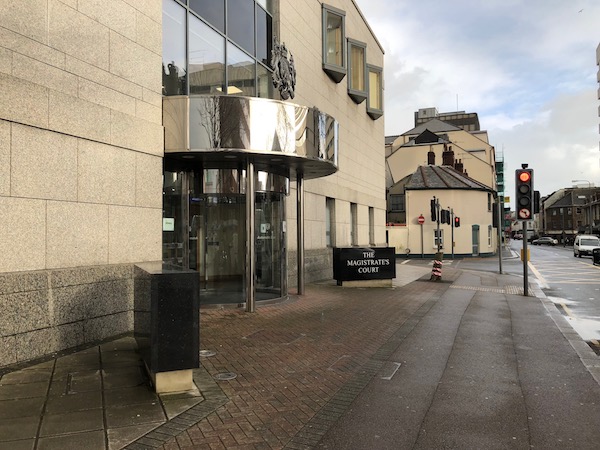
Charges have been dropped against a 69-year-old man accused of raping two women with learning disabilities in the 1970s after the Court refused to allow the prosecution to use a recorded interview of one of the women as evidence.
Dennis Humble was charged with three counts of rape in February 2017 and was originally due to face a jury trial in November 2017.
Crown Advocate Matthew Maletroit, who was leading the Prosecution, read a short statement explaining the Prosecution's reasons for dropping the charges in the Royal Court yesterday, in the presence of the Deputy Bailiff Tim Le Cocq as well as Jurats Sally Sparrow and Antony Olsen.
He said Mr Humble was facing allegations of rape from two complainants with "significant learning disabilities." He said that the case had involved a "particularly complex" investigation and the "challenging" retrieval of documents dating back 40 years.
The Crown Advocate explained that after careful consideration of all the evidence, the prosecution considered that there was enough evidence to prosecute. As a result, Mr Humble was formally indicted in the Royal Court in April 2017 and a date for a jury trial set for November 2017
However, the defence, led by Advocate Howard Sharp, said the prosecution had committed an "abuse of process" by bringing the case against Mr Humble to court, because too much time had passed since the alleged offences. The Court however allowed the prosecution to continue. Shortly before the trial was due to take place, the defence asked for a psychologist to examine both complainants, which caused a further adjournment to February 2018.
Crown Advocate Maletroit said that while the Defence raised issues regarding the admissibility of her evidence, the prosecution had remained satisfied they could proceed.

Pictured: Mr Humble was charged in the Magistrate's Court in February 2017.
However the Court, presided over by the Deputy Bailiff Tim Le Cocq, refused to allow the prosecution to use a pre-recorded interview of the first complainant, who had made two allegations of rape against Mr Humble, as evidence in the case. Crown Advocate Maletroit explained that the complainant's health had significantly deteriorated, to such an extent that it affected her ability to communicate. He said that as a result it was no longer possible to record an interview with her. The prosecution asked for a witness statement dating from 2013 to be admitted as evidence but the Court rejected it.
The Crown Advocate said these decisions meant it was not possible to put the witness’s evidence in chief before the jury. As a result, the Crown Advocate said that the case against Mr Humble was "undoubdedly weakened" and that there was "no realistic prospect of conviction" with only the evidence of one of the women. He however added this did not mean the prosecution had drawn "any adverse conclusion" towards the truthfulness of the other woman's evidence.
Crown Advocate Maletroit concluded that the prosecution was not able to offer any evidence in the case and ordered for the charges to be dismissed.
Following the hearing, Advocate Sharp said: "Mr Humble is man of impeccable good character and has spent his whole life working with adults with learning difficulties. He has always denied the allegations and voluntarily attended a police interview in the UK when he answered questions. Nonetheless, he was charged with three counts of rape."

Pictured: Advocate Howard Sharp was defending Mr Humble.
Advocate Sharp explained that the defence challenged the reliability of the first complainant's evidence, partly because she has "dementia and a history of mental disturbance and violent outbursts." He added that the manner in which the evidence was obtained was also unfair. He explained: "In simple terms, the police had sought to record her evidence by video (a normal process) but had failed to turn on the correct video camera with the result that one could not see her face (only the top of her head) and therefore the Jury had no prospect of assessing her demeanour and therefore her credibility that is so important.
"The prosecution knew or ought to have known that the video was deficient but choose not to redo the video when they could have done and instead served it as the Crown’s evidence on 4 April 2017. Ultimately, it was a problem that the prosecution caused for themselves."
Advocate Sharp said the defence had also challenged the evidence of the second complainant and were awaiting rulings from the Royal Court to know if they would be able to cross examine her about other complaints she had made against other men that the defence said were false.
He added: "We were also waiting for an important ruling on an earlier account given by the second complainant in 2007 that, if true, completely undermined her allegation against Mr Humble. You will have noted that the Crown decided that her evidence did not have a realistic prospect of conviction even before these rulings could be handed down."
Advocate Sharp also noted that the Crown’s statement didn't mention any delay in Mr Humble's case. He said: "Despite being asked by the Court at the last hearing, the prosecution and the police cannot explain why they did nothing to progress this matter between the end of 2013 and the start of 2017."
Comments
Comments on this story express the views of the commentator only, not Bailiwick Publishing. We are unable to guarantee the accuracy of any of those comments.